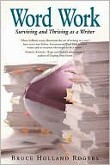Another
Column at MyShelf.Com
|
|||||||||||
| Back To Literature, Past |
|||||||||||
| Plagiarizing Isn’t All It’s Cracked Up To Be! Plagiarism is often misunderstood by readers and authors alike, and that misunderstanding affects our reading and writing enjoyment. It seems a case of plagiarism hits the news at least once a year. This is a new year. We are due for another. When it happens people will weigh in with opinions on blogs, Twitter, and Facebook, so it will help to know what plagiarism is and what it isn’t. The kind of plagiarism that authors worry about is quite rare—that is, having an agent or someone in a writing class steal an idea. It’s hard to steal an idea. For one thing, there are no truly new ideas in the world. If you don’t believe me, read Joseph Campbell’s works (which you should do anyway). He divides all of literature from Greek plays forward into a few categories with a few basic elements. Ideas cannot be copyrighted. A recent court case reaffirmed this notion. It played out in London, but it applies to us all. If the case had not gone as it did, much of Shakespeare’s works would be considered plagiarism and, because science fiction writers often borrow theories from those who win Nobel prizes in physics, that genre could no longer exist as we know it. Many kinds of borrowings are not plagiarism but merely the result of the similar way our brains function. You’ve probably heard the story of monkey colonies on one island who take up the habits of monkeys on another island with no understandable way for them to have communicated. You should know that anyone who used an author’s idea would surely write a different book. Authors might bolster their confidence by trying this exercise: Ask three writers to pen a piece using a very specific subject—maybe even something you’ve considered writing yourself. My critique group used a story about how, as a child, one of our members sneaked into a neighbor’s house and ate frosted strawberries out of the Fridge. We then set a lunch date and read each work aloud. In spite of the similar plot lines, the voices, characters, and details were so different we wondered why we had been concerned about a fellow writer stealing an idea. Usually, a writer won’t be interested in writing someone else’s stuff, anyway. Writing, after all is about self expression. And readers? They may not want to go to the trouble of trying an exercise like this, but it’s my hope that when they read news of plagiarism, they’ll see it a bit different light. Plagiarism—like much in the world—is not black and white. It is far more nuanced. Often when a case of plagiarism occurs among those who have the public trust, it gets lots of press. However, by the time the perpetrator is found innocent, the case has lost its news value, and we never hear about the accused’s exoneration. Thus, authors and readers feel bombarded with reports of plagiarism-that-never-happened. Those cases may sometime take on the stature of urban myth. Careers of a few writers have been broken into kindling when plagiarism was uncovered, but sometimes the opposite happens. Near-anonymous writers or those relegated to the obscure halls of academia become household names when they are found to have picked clean the bones of others’ words. When controversy threatened to tarnish names like Stephen Ambrose and Doris Kearns Goodwin they became known among people who would never have heard of them before. I’ve often wondered if they were accused unjustly, if they made only an honest mistake and if they indeed did plagiarize—if they found all the coverage to their advantage. Many times plagiarism goes unnoticed because the thief is not caught or his work is so poor that even stealing cannot make it star-worthy. But think! Think! How much is written, published, put out into the world. The chance that your story might be the one stolen is minuscule. Plagiarism is most rampant in academia. If you need proof, Google “plagiarism.” Yep, a few famous cases and lots more stories about kids trying to make the grade at school. We cannot condone such theft, but authors should not allow the idea of plagiarism to doom the progress of their writing careers. Generally it is only the poor young schmuck who grabbed down someone else’s work who suffers—whether or not he is caught. Another consideration. If someone should swipe a few words or an
idea from a writer, his chances of becoming rich, famous, and envied
because of them are no better than the writer's. If he should, that
sets him up for legal action worth pursuing. If he doesn’t
get rich on an author’s work, the author has the satisfaction
of knowing he didn’t, and won’t need to bother her talented
head about chasing after a pauper. Authors might even benefit. The
publicity surrounding such a case could be the lucky stroke that
makes her the rich, famous, and envied author.
© MyShelf.Com. All Rights Reserved. |
|||||||||||
